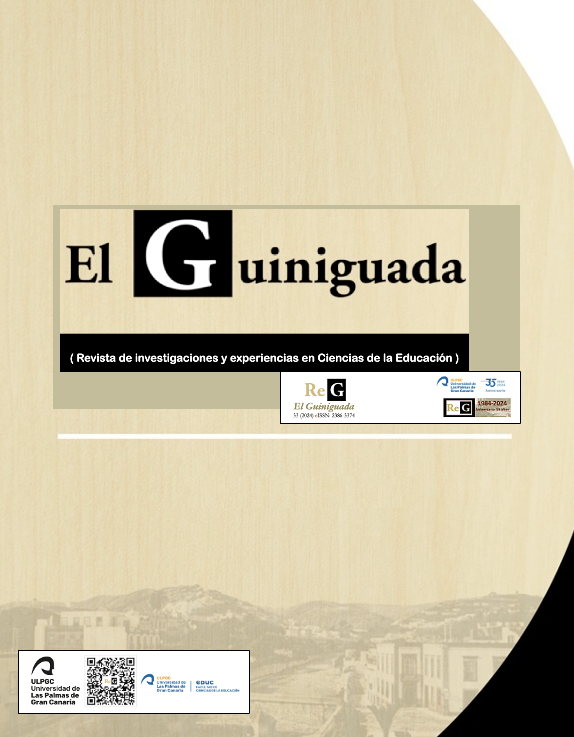The role of Spanish in language education within language programs subject to special regulations
10.20420/ElGuiniguada.2024.722
Keywords:
enseñanza de idiomas extranjeros, didáctica de la lengua y la literatura españolas, enseñanza del español, escuela, españolAbstract
This article examines the current role of the Spanish in language education within language programs subject to special regulations. For this purpose, a descriptive quantitative study was conducted, surveying 44 out of the 71 Official Language Schools (EOI) that offer the possibility of study Spanish as a foreign language (62%). The findings provide pioneering insights into this topic, revealing the Spanish language make up approximately 8% of the total offerings in EOI. Despite encountered challenges and limitations, the study highlights the potential of EOI as a valuable institution within the European framework to promote Spanish language. Thus, futures research in this subject are claimed to enhance the quality specialized regulation programs, particularly in the context of Spanish language instruction.
Downloads
References
Araujo Portugal, J. C. (2018). Las enseñanzas especializadas de idiomas de las escuelas oficiales de idiomas: Presente y futuro.eCO. Revista Digital De Educación Y Formación Del Profesorado., (15), 1-18.
Asensio Pastor, M. I., y Carmona García, J. P. (2019). Exploratory research for the improvement of the teaching of spanish as a second language in a spanish public center. Languages, 4(95), 1-22. https://doi.org/10.3390/languages4040095
Bernabé Villodre, M. (2013). Enseñanzas de Régimen Especial y nuevas tecnologías. Una experiencia en el Conservatorio Profesional de Música de Torrente. Educatio Siglo XXI, 31(1), 193–212.
Cancelas-Ouviña, L., y Hurtado-Sierra, A. (2020). El aprendizaje y servicio (aps) en la enseñanza del alemán: Una propuesta innovadora para la escuela oficial de idiomas. Revista De Estudios Socioeducativos, (8), 113-132. https://doi.org/10.25267/Rev_estud_socioeducativos.2020.i8.9
Carmona García, J. P. (2018). La enseñanza de E/LE a inmigrantes en las Escuelas Oficiales de Idiomas de Andalucía: retos y propuestas. DoblELE, (4), 122-139. https://doi.org/105565/rev/doblele.44
Chacón Reales, L. J., Robalino Morales, G. E., Peñafiel Luna, A. C., Cárdenas Medina, J. H., y Cantuña-Vallejo, P. F. (2022). El muestreo intencional no probabilístico como herramienta de la investigación científica en carreras de ciencias de la salud. Revista Universidad Y Sociedad, 14(5), 681-691.
Duque Vaca, M. A., Tuapanta Dacto, J. V. y Mena Reinoso, A. P. (2017). Alfa de Cronbach para validar un cuestionario de uso de TIC en docentes universitarios. MktDescubre, 1(10), 37-48.
Garcias Salvà, M. (2006). Les escoles oficials d'idiomes de les illes balears. Anuari De L'Educació De Les Illes Balears, 35(1), 158-175.
Garvida, M. M. (2009). Review of diplomas de español como lengua extranjera (DELE). International Journal of Pedagogies & Learning, 5(1), 4-10. http://dx.doi.org/10.5172/ijpl.5.1.4
Hernández González, O., Antonio, A., González Fernández, D., y Contreras Sáez, M. (2020). Consideraciones esenciales sobre el tema ético en la investigación educativa. UCMaule, (58), 141-164. https://doi.org/http://dx.doi.org/10.29035/ucmaule.58.141
Ley Orgánica 2/2006, de 3 de mayo, de educación. Boletín Oficial del Estado, 106, de 24 de mayo de 2006. https://www.boe.es/eli/es/lo/2006/05/03/2/con
Ley Orgánica 3/2020, de 29 de diciembre, por la que se modifica la ley orgánica 2/2006, de 3 de mayo, de educación. Boletín Oficial del Estado, 340, de 30 de diciembre de 2020. https://www.boe.es/eli/es/lo/2020/12/29/3
Liñán Maza, T. (2020). Las escuelas oficiales de idiomas: Una perspectiva histórica. eCO. Revista Digital De Educación Y Formación Del Profesorado, (17), 465-489.
Martínez Serrano, G., Ballester Carmona, S., y Oliver Castellano, J. S. (2021). Las enseñanzas de régimen especial. En A. Asegurado Garrido, y J. Marrodán Gironés (Eds.), La LOMLOE y su análisis. una mirada técnica (pp. 129-142). ANELE – USIE
Mateo Andrés, J. (2009). La investigación ex post-facto. En R. Bisquerra Alzina (Ed.), Metodología de la investigación educativa (pp. 195-230). La Muralla.
Real Decreto 1041/2017, de 22 de diciembre, por el que se fijan las exigencias mínimas del nivel básico a efectos de certificación, se establece el currículo básico de los niveles Intermedio B1, Intermedio B2, Avanzado C1, y Avanzado C2, de las Enseñanzas de idiomas de régimen especial reguladas por la LOE. Boletín Oficial del Estado, 311, de 23 de diciembre de 2017, 1-64. https://www.boe.es/buscar/pdf/2017/BOE-A-2017-15367-consolidado.pdf
Roselló Verdeguer, J. (2021). Metodología sociolingüística y enseñanza de ELE. MarcoELE: Revista De Didáctica Del Español Como Lengua Extranjera, (33), 1-19.
Tirado Olivares, S., Vázquez, A. M., y Toledano, R. M. (2021). La docencia virtual o e-learning como solución a la enseñanza de la física y química de los futuros maestros en tiempos de COVID-19. Revista Española De Educación Comparada, (38), 190-210. https://https://doi.org/10.5944/reec.38.2021.28853
Published
How to Cite
Issue
Section
License
Copyright (c) 2024 José Ángel Tejero López

This work is licensed under a Creative Commons Attribution-NonCommercial-NoDerivatives 4.0 International License.
Authors who publish with this journal agree to the following terms:
- Authors retain copyright and grant the journal right of first publication with the work simultaneously licensed under a Creative Commons Attribution License that allows others to share the work with an acknowledgement of the work's authorship and initial publication in this journal. You can not make a commercial use of the work. The use derived from the work is also not allowed.
- Authors are able to enter into separate, additional contractual arrangements for the non-exclusive distribution of the journal's published version of the work (e.g., post it to an institutional repository or publish it in a book), with an acknowledgement of its initial publication in this journal.
- Authors are permitted and encouraged to post their work online (e.g., in institutional repositories or on their website) prior to and during the submission process, as it can lead to productive exchanges, as well as earlier and greater citation of published work (See The Effect of Open Access).
















